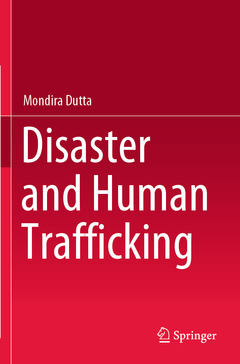Description
Disaster and Human Trafficking, 1st ed. 2021
Author: Dutta Mondira
Language: English
Subject for Disaster and Human Trafficking:
Approximative price 137.14 €
In Print (Delivery period: 15 days).
Add to cartPublication date: 07-2022
189 p. · 15.5x23.5 cm · Paperback
Approximative price 137.14 €
In Print (Delivery period: 15 days).
Add to cartPublication date: 07-2021
Support: Print on demand
Description
/li>Contents
/li>Biography
/li>Comment
/li>
The book highlights the root cause of human trafficking and analyses how factors of vulnerability affect the marginalized, especially during and after a disaster. Human trafficking like other studies on disaster research, needs to be tackled from various perspectives such as empowering the vulnerable people, creating awareness, strengthening the disaster risk reduction measures and creating a common platform to fight the vicious circle by breaking its continuity and making strategies victim centric and people friendly.
The book adapts a multidisciplinary approach embedding concepts from political, social, economic and anthropological perceptions. The discourse in the book revolves around the emotional and psycho-social stress factors including weak implementation of laws and policies at various levels. The content weaves around three themes -- magnitude and interlinks between disaster and human trafficking; policies and protocols on disaster risk reduction and human trafficking and community participation and institutional support. Through these themes, the volume works on identification of the vulnerable areas which are not in compliance with the Sendai Framework of Action, 2015 in the backdrop of the Disaster Management Act of India, 2005. The volume will be of immense interest to a wide range of practitioners, researchers, academicians, policy makers, political leaders, gender experts, international organizations, disaster management authorities, civil society organisations, and scholars working in the area of human rights in general and trafficking in particular.
Note: This research was funded by Indian Council of Social Science Research (ICSSR).
- Anju Dubey Pandey, Gender Responsive Governance and Ending Violence against Women Specialist, UN Women, New Delhi, India
Context
Interlinks between Disaster and Human Trafficking
Policies and Protocols on DRR and Human TraffickingCommunity Participation and Institutional Support
Scope & Methodology
CHAPTER II: Links Between Disaster and Human Trafficking
Disaster and Human Trafficking – A Perception
Disaster Management Act, 2005
Sendai Framework of Action and Sustainable Development Goals
Crime Against Women and Human Trafficking
Trafficking in Persons- The Vulnerable Areas
CHAPTER III: Role of NGOs and Community Participation
Significance of Community Participation
Community Based Preventive Measures
Awareness and Sensitization
Networking, Advocacy & Media
Training & Capacity Building
Vigilance, Prosecution & Conviction
Information, Education & Communication (IEC) Materials
CHAPTER IV: Protocols, Policies and Role of Civil Society Organizations
The Legal Framework
International Protocols
Sustainable Development Goals (SDG)
Regional Policies
Civil Society Organizations
CHAPTER V: Institutional Mechanisms, Gaps and Challenges
Background
State Machinery
Non-Governmental Organisation
Challenges and Opportunities
CHAPTER VI: Conclusion
ANNEXURES
I Advisory from Home Ministry, GOI
II Advisory of Ministry of Home Affairs, 2012
III TIP Report 2019: Country Narrative (India)IV Disaster Risk Reduction and Resilience Building in the 2030 Agenda for Sustainable Development UNISDR
With teaching and research experience spanning over four decades, Mondira Dutta has been the Founder Chairperson of the Centre for Inner Asian Studies, School of International Studies, Jawaharlal Nehru University (JNU), New Delhi, India. Her research focuses on gender studies, disaster research and human security, collecting varied experiences from her widely travelled field visits among the various remote areas of South Asia including Afghanistan, Central Asia and other parts of the world. She has been an ICSSR (Indian Council of Social Science Research) Senior Fellow at the Special Centre for Disaster Research, JNU and has been the India Chair under the Indian Council of Cultural Relations at Dublin City University, Ireland in 2019. She was awarded the ‘Lifetime Achievement Award’, at the International Congress of Women for Justice, Equality, Peace and Progress, sponsored jointly by the United Nations Information Centre for India and Bhutan. As a Consultant to UN Women, her work on Human Trafficking is widely acclaimed. Her most recent study as a Consultant cum Senior Researcher to the UN Women was on the ‘Socio Economic Impact of COVID 19 – Gender Perspectives’ in collaboration with NITI Aayog, Oct 2020.
Examines all likely impacts of disasters on human trafficking and its links in the abuse of human rights
Critically observes the modern-day slavery based on rich field-based experiences
Studies the synergy of existing theories, laws and approaches on a common platform of relevance
Offers decision-making processes within the rights-based perspective

